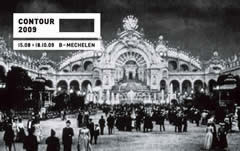Contour 2009 - 4th Biennial of Moving Image
15 Aug - 18 Oct 2009
Hidden In Remembrance Is The Silent Memory Of Our Future
15 August - 18 October 2009
Curator: Katerina Gregos
The exhibition ‘Hidden in Remembrance is the Silent Memory of our Future’ comes at a timely moment to consider recent history, as it takes place twenty years after a key historical moment in twentieth century history. The European map has changed considerably since then, as have the geopolitical situation, cultural values and traditional notions of identity; post-1989 euphoria has now evaporated. The necessity to negotiate the present, through an understanding of the past is becoming more entrenched in historical theory, overthrowing ideas about the ‘end of history’ and the dominant culture of ‘presentism’. Mechelen, itself a city steeped in history, poised between past, present and future, seems the perfect place to engage such questions.
Contour 2009 will revolve around questions of historical representation, will explore how historical narratives are constructed, and will engage in a process of historical re-evaluation demonstrating the increased importance of historical context in a large segment of contemporary art practice. The biennial, however, will not be governed by an overbearing curatorial concept which instrumentalizes artistic practice under one rubric, but will allow room for artists to present multiple perspectives on the chosen theme – whether social, political or personal - perspectives that will shed light on the ‘jigsaw that is history’, as the historian E. H. Carr famously called his discipline. Thus the biennial will not be an exhibition about something specifically historical or a specific historical period, but rather a series of refl ections on diff erent aspects of the historical and historiographic, relating to our modern past. Likewise, the exhibition will not be constructed as a linear narrative but will consist of autonomous chapters or short stories, which may or may not connect to one another.
The participating artists take recourse in the past to re-frame the present and to demonstrate the complex and often persisting entanglements between past, present and future. They highlighthow the residue of history affects our perception of the present as well as our imaginings of the future. Employing a variety of narrative strategies, they reflect on memory and the passage of time, often creating distinct ‘chronotopes’ of their own. Their work foregrounds practices of retrieval, researching, referencing, recycling and finally interpreting historical material anew, often to dismantle the authority of dominant historical narratives, or to bring to the fore repressed or peripheral narratives.
How does one deal with the spectre of history and the ghosts of the past? How is history written and by whom? Whose history is it? Contour 09 advocates the importance of history in our age of forgetting. To quote Eric Hobsbawm, one of the greatest historians of our time, “History alone provides orientation and anyone who faces the future without it is not only blind but dangerous, especially in the era of high technology”. In any case, an understanding of history – or histories, as is perhaps more correct a term - is paramount as it entails an understanding of social and cultural being.
De deelnemende kunstenaars duiken onder in het verleden om de complexe verwevingen bloot te leggen tussen verleden, heden en toekomst. Ze onderstrepen hoe de resten van de geschiedenis onze perceptie van het heden en onze voorstelling van de toekomst beïnvloeden. Aan de hand van een aantal vertelvormen brengen ze bespiegelingen over geheugen, herinnering en het voorbijgaan van de tijd. Ze maken zo hun eigen chronotopen of tijdruimtes. In hun werk onderzoeken, recycleren en interpreteren ze historisch materiaal. Vaak vallen ze daarbij de autoriteit van de heersende patronen aan of dragen ze nieuwe of onderbelicht gebleven verhaallijnen aan.
Hoe wordt de geschiedenis geschreven? Wie schrijft geschiedenis? Contour 09 verdedigt het belang van geschiedenis in onze tijd van vlug vergeten. Om Eric Hobsbawm, een van de grootste actuele historici, te citeren: “Alleen de geschiedenis kan ons helpen om een richting te vinden. Wie zonder de geschiedenis naar de toekomst kijkt, is niet alleen blind. Hij/zij speelt een gevaarlijk spel, zeker in deze hoogtechnologische tijden.” Een afdoende kennis van de geschiedenis – of liever, van ‘geschiedenissen’ – is van groot belang om sociale en culturele processen te begrijpen.
The exhibition will showcase a variety of practices but will focus more on work that features complex, layered narratives and rich, memorable visual languages, which are often consciously cinematic, as well as practices that are obviously hand crafted and labour-intensive. Lastly, the exhibition aims to argue for the deceleration of perception by including works that need to be viewed from beginning to end, works that are more gradually immersive, unfolding over time. Many artists will augment their film and video installations with other visual material. The exhibition will present recent as well as newly commissioned work by the participating artists.
Katerina Gregos
Artists:
Eija-Liisa Ahtila
Herman Asselberghs
Yael Bartana
Ulla von Brandenburg
Andreas Bunte
Lene Berg
Michaël Borremans
Matthew Buckingham
Chto Delat
Maryam Jafri
David Maljkovic
Vincent Meessen
Nathaniel Mellors
Wendelien van Oldenborgh
Julian Rosefeldt
Mira Sanders
Yorgos Sapountzis
T.J. Wilcox

